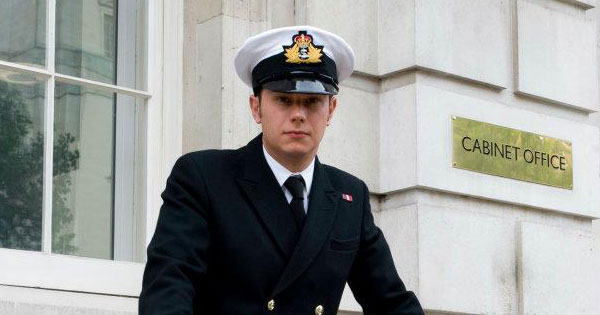
I joined the Royal Naval Reserve in 2005. At the time, I was thinking about a full time career in the Navy, but I decided to remain a reservist as I felt it gave me the best of both worlds. So when I was made redundant from my civilian job a few years ago, the opportunity to deploy to Bahrain with the Navy for 6 months provided the perfect fall back. I liked it so much that I undertook another deployment– this time at sea – straight after.
The skills I gained during this period provided a gold mine of examples to draw upon in competency-based interviews and definitely helped me when I applied to the Cabinet Office.
Everyone trains in basic naval skills before specialising. So I had to do the new entry course at HMS Raleigh in Cornwall and officer training at Britannia Royal Naval College in Devon. Although the courses were condensed compared with full time service, you still need to meet the same fitness and other standards. I also regularly do courses in first aid, sea survival and firefighting. This generalised training is often the most fun part. Training with the reserves has helped me develop transferable skills in areas like teamwork, leadership and problem-solving. I’ve learnt to work under pressure and to focus on the important things, often in challenging circumstances. It’s extremely relevant to an organisation like the Civil Service, and obviously being a Media Operations Officer is particularly pertinent to working in communications – although other people choose to pursue a role that’s completely different from their civilian career.
Like the Royal Navy, the Army and RAF also have their media specialists drawn from the reserves. They are a pool of expert manpower, either for ad-hoc duties, or mobilised for a full operational deployment. In the past few years, the Royal Navy’s media specialists have filled headquarters roles in Afghanistan, Iraq, Bahrain, Naples and the UK. Media officers have also served at sea off the coasts of Libya and Somalia, in the Gulf and the Caribbean as well as at the London Olympics. The fact they have been so busy is testament not only to the high tempo of operations, but also the importance of communications to defence.
It’s a bit like being a press officer at sea. Day-to-day work includes escorting journalists to deployed ships and operational theatres, advising senior officers on communications strategies and briefing them before interviews, generating stories and coordinating output, monitoring foreign media, training personnel prior to deployment, and shielding service personnel and their loved ones in emotionally charged situations.
There is definitely a bigger element of logistics involved. Getting journalists to sea in the first place can be a major effort – involving everything from helicopters to hovercraft – and the naval environment presents particular challenges for communicators, such as balancing the desire to be open against the need to protect operational security and working with countries where attitudes to the media are different to our own.
However, despite the extreme situations or glamorous locations, the lessons learned are still transferable. As a junior officer briefing a ship’s captain before an interview, I’m required to show the same mix of credibility, confidence and tact as I do in the Civil Service when I brief a government minister.
Sometimes a reservist can bring a completely fresh perspective, free from the usual conventions of military thinking. A colleague of mine worked for a wildlife conservation organisations. When he was sent serve on a frigate off Iraq, he helped to produce a programme for BBC Radio 4 on migratory bird routes in the North Arabian Gulf, and was able deliver to deliver naval messages to a previously untapped audience.
Media interest is inevitably highest during times of conflict. In 2011 I was involved with shepherding broadcasters on board HMS Ocean to witness the first Apache helicopter strikes over Libya.
However, flying the white ensign is a powerful gesture, and Royal Navy media operations officers can find themselves making a direct contribution to the UK’s ‘soft power’. I’m particularly proud of organising a press conference on board HMS Albion in Abu Dhabi in 2011 which helped reassure allies in the Gulf of the UK’s continued ability to meet its commitments in the region following the Strategic Defence and Security Review. The previous year a colleague similarly helped played an important role in managing coverage of the UK’s response to the catastrophic earthquake in Haiti .
I’ve certainly had some fantastic experiences: sailing through the Suez Canal; serving on a Turkish warship for anti-piracy patrols off Somalia; and being within sight of Tripoli the day the Libya campaign officially ended. And at home I’ve had the privilege of representing the Navy on Remembrance Sunday and at other events and I’ve made lasting friendships.
Joining the reserves is quite simply the best decision I’ve ever made – and I’d definitely recommend other government communicators giving it a look.
This case study originally appeared on the Government Communication Network website
